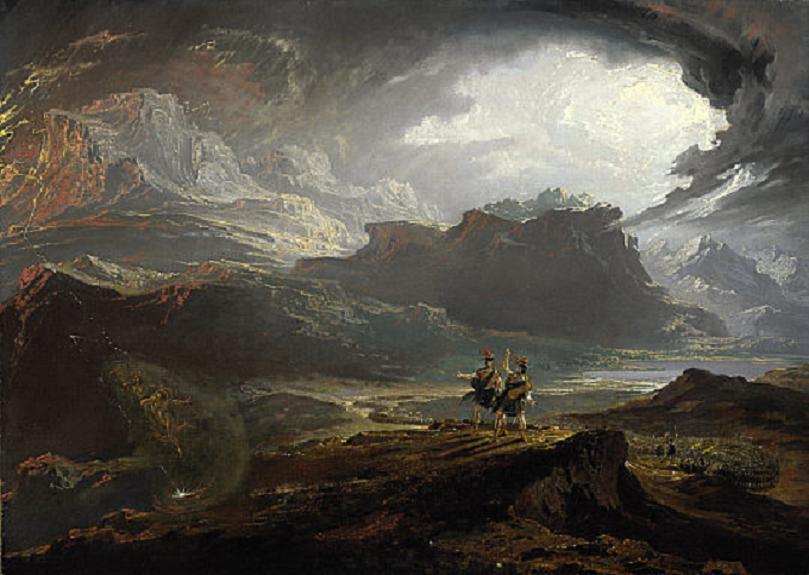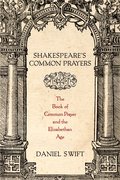By Daniel Swift
Susan Sontag wrote that having a photograph of Shakespeare would be like having a piece of the True Cross. We don’t have a photograph, of course, and even the portraits that we do have are unreliable, but in his plays he left snapshots of a different kind. Since we know with some precision — thanks to the diligence of many scholars — the sources he relied upon in writing the plays, we are able to trace his creativity by a simple contrast. By paying attention to what he retains from his sources, and what he changes, we may produce — like developing a photograph from its negative — a portrait of Shakespeare at work.
The principal source for the plot of Macbeth is the massive Chronicles of England, Scotland, and Ireland, compiled by Raphael Holinshed and first published in 1577. Holinshed narrates how Macbeth was “sore troubled” by King Duncan’s nomination of his son Malcolm as heir to the throne, and “he slue the king at Enuerns, or (as some say) at Botgosuane, in the sixt year of his reigne,” on 15 August 1040. Macbeth is, according to Holinshed, not immediately a tyrant: “governing the realme for the space of ten yeares in equall justice,” he becomes increasingly paranoid and murderous, and eventually “He was slaine in the yeere of the incarnation 1057” by Malcolm, who assumes the throne.

This compression of seventeen years into what feels like only weeks isn’t incidental to the play. The central character is obsessed with the rushing passage of time. The witches promise Macbeth that he shall be king, but they also show him a vision of the eight kings that will follow him, all of whom are the heirs of Banquo. “What!” he declares, “will the line stretch out to th’crack of doom?” He is horrified that Banquo’s family will rule until, it seems, the end of time, while his kingship is only temporary. Later, when he hears of the death of his wife, he says:
She should have died hereafter,
There would have been time for such a word.—
Tomorrow, and tomorrow, and tomorrow,
Creeps in this petty pace from day to day,
To the last syllable of recorded time.
He longs for eternity, for the endless deferral of the present, but he is like all of us trapped inside too-short human time.
15 August reveals much about this play and its author. Shakespeare’s is an art of intensification. He condenses years into moments, bitter rivals into lovers, and in particular the tragedies hinge upon the shortness of time. In both Romeo and Juliet and King Lear, messages are delivered only moments too late and cause deaths. “The weight of this sad time we must obey” says Edgar at the end of King Lear, and in Othello — another play whose timespan Shakespeare has drastically reduced from his source — the hero echoes this line: “We must obey the time.”

Shakespeare disobeyed the time given by his source. He denies Macbeth the seventeen years for which the historical king ruled. He is, after all, writing tragedy, not faithful history, but August 15 might have taught him how to do this. According to other chronicle accounts of this period — although not Holinshed — the date when Macbeth was killed in 1057 was also 15 August. The day of his accession to the throne was also the day of his death, and the historical original, like his dramatic counterpart, simply ran out of time.
Daniel Swift is Senior Lecturer for English at the New College of the Humanities. His first book Bomber County: The Poetry of a Lost Pilot’s War was long-listed for the Guardian First Book Award and the Samuel Johnson Prize. His latest work, Shakespeare’s Common Prayers: The Book of Common Prayer and the Elizabethan Age is scheduled for publication in the autumn.
Subscribe to the OUPblog via email or RSS.
Subscribe to only literature articles on the OUPblog via email or RSS.
View more about this book on the ![]()
![]()


[…] In controversy lies good drama; Shakespeare knew this. In courting danger, and in shocking the audience, his plays achieve their magic. They are never only of one side. But Shakespeare had, too, a more personal interest in the heated religious tensions of this specific moment. Immediately after the discovery of the Gunpowder Plot, new laws were passed which aimed to expose secret Catholics: church attendance was carefully watched, and on 5 May 1606 twenty-one people at Stratford upon Avon were charged with not having received Communion at church. Among them was Susannah, Shakespeare’s oldest daughter. We cannot know, now, if this suggests that she was Catholic, but we can know that she at this moment of political tension resisted going to church; that she felt, for a moment, on the side of those opposed to the king. This much Shakespeare knew, too, as he wrote a play at whose heart is the ambiguous, sympathetic portrayal of a man who kills a king and who is punished for it. 5 November, for us as for Shakespeare, is a reminder of what it might be to find oneself on the wrong side, or to be torn. Daniel Swift is Senior Lecturer for English at the New College of the Humanities. His first book Bomber County: The Poetry of a Lost Pilot’s War was long-listed for the Guardian First Book Award and the Samuel Johnson Prize. His latest work, Shakespeare’s Common Prayers: The Book of Common Prayer and the Elizabethan Ageis scheduled for publication in the autumn. Read his OUPblog article about 15 August 1040: the day Macbeth killed King Duncan I of Scotland. […]
The historical setting gives depth to my understandinf and imcreases my appreciation. Thank you Daniel Swift.